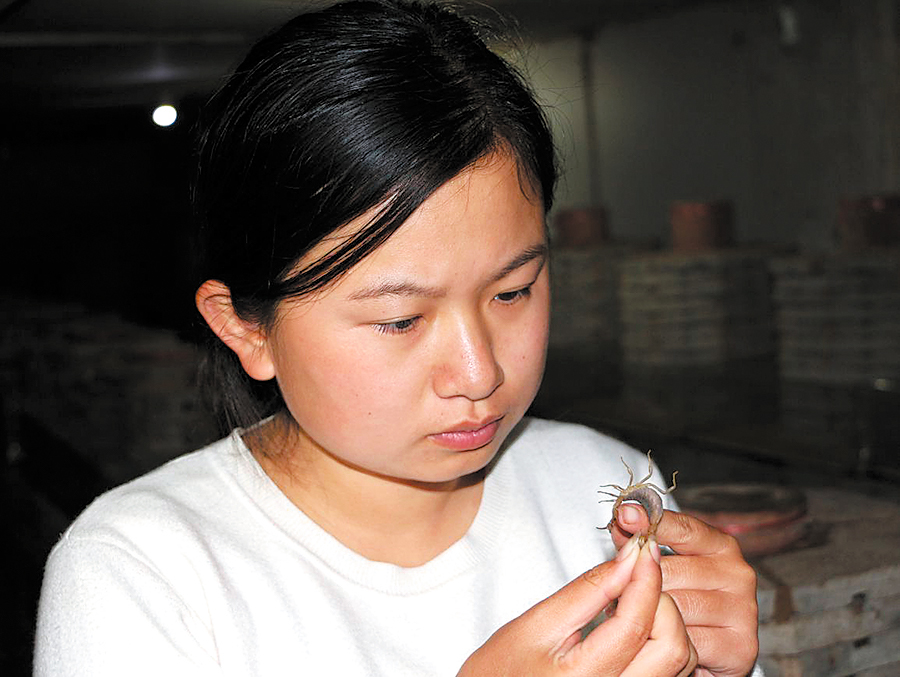Watching weather makes scorpion breeder better
By Li Menghan | China Daily | Updated: 2024-05-16 09:40

A rural entrepreneur has found success with her Chinese scorpion farm after learning how to create an environment that provides the crucial weather conditions necessary for the creature to thrive.
"My scorpion breeding house began as a 30-square-meter space, yielding only a few tens of kilograms of scorpions 16 years ago. It has now expanded to cover an area of over 25,000 sq m," said Fang Cheng, a farmer in Jining, Shandong province.
Fang, 34, added that the total output of scorpions from her and her associates in the city's Yanzhou district amounted to 13 metric tons last year, with sales reaching 20 million yuan ($2.8 million).
Characterized by a segmented curved tail tipped with a venomous stinger, the Chinese scorpion has long been acknowledged for its medicinal value in traditional Chinese medicine in treating conditions such as chronic pain, arthritis and certain types of cancer. "Although it's considered one of the most venomous creatures in China, a scorpion is fragile and hard to raise due to its sensitivity to changes in temperature and moisture," Fang said.
Her path to success began with her father's sudden bankruptcy, which not only plunged the once prosperous family into a 2-million-yuan debt, but also forced Fang to forgo her aspirations to study overseas. Drawing inspiration from the scorpion catchers she observed when she was a child, she resolved to convert her family's chicken coop into a scorpion breeding facility to earn a living.
When Fang first started the business in 2008, she knew little about it. Her only understanding was that they thrive in environments with high temperatures and moisture.
She considered using a warm air machine to regulate temperatures, but the power costs associated with running it would've amounted to about 1,000 yuan per month. So her father helped her create a heating contraption using an empty petroleum drum, with the opening at the top providing air circulation and sawdust inside used as combustible material.
"Considering the large size of the petroleum drum, we opted for a rather sizable opening, fearing that the heat might not dissipate effectively," Fang said. "I put the contraption into use in the morning, and when I checked after lunch, the temperature had skyrocketed to 54 C within just one hour, leaving all of the nearly 1,500 scorpions dead."
Undeterred by the setback, Fang decided to move into the breeding house to provide more meticulous care and conduct better observations of the creatures. "Every night before I went to bed, I had to hold up a lamp and carefully inspect both the top and bottom of my bed — a foam board — to see if any scorpions had crawled in," she said.
However, due to the nocturnal nature of scorpions, she was still stung multiple times. Fang said while the stings were non-fatal, they were extremely painful and led to symptoms such as shortness of breath and dizziness.
After living with scorpions for two years, Fang gained a thorough understanding of their behavior and developed a habit of closely monitoring the weather.
"Scorpions are heterothermic animals whose body temperatures adapt to the surrounding environment. Nevertheless, excessively high temperatures can result in illness, while excessively low temperatures can lead to sluggish growth," she said, adding that the preferred temperature for them falls within the range of 30-35 C, with ideal humidity levels between 50 and 70 percent.
Fang said that if the weather forecast indicates prolonged dryness, it's essential to turn on the humidifier to prevent the scorpions from dehydrating. Conversely, during consecutive overcast and rainy days, it's important to use supplemental lighting to facilitate their absorption of essential elements such as calcium and phosphorus, thereby enhancing their growth and aiding the molting process.
Fang has sought to share her knowledge of scorpion breeding with others. From posting advice on the online community forum Baidu Tieba to offering guidance to breeders who come to Jining to meet her, she said helping others succeed has been fulfilling for her.
She even found love as a result of her efforts, as her husband is one of the breeders who traveled to Jining to learn from her.
Fang has also looked to help people in other ways. She initiated a poverty-relief program seven years ago, allocating profits from a specific section of her breeding farm to 19 low-income families in her village.
Each of the family members receives 500 yuan per year. These families may have only one breadwinner, and they may be unsuitable for labor-intensive work such as planting or work that demands substantial upfront investment such as scorpion farming.
To promote intelligent and automated large-scale farming, Fang relocated her breeding center to an agricultural high-tech demonstration park several years ago. She is now able to monitor real-time data on temperatures, moisture and sunlight at the facility using multiple sensors, which enable automated ventilation and light supplementation through automatic comparison with standardized data.
"Although my capacity is limited, I am committed to persisting in my efforts," Fang said.
limenghan@chinadaily.com.cn
























